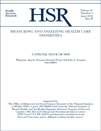
HEALTH SERVICES RESEARCH
Scope & Guideline
Transforming healthcare delivery with empirical insights.
Introduction
Aims and Scopes
- Health Services Delivery and Systems Research:
Focuses on the efficiency, accessibility, and quality of health services across different systems, evaluating how these factors affect patient outcomes and health equity. - Patient-Centered Care and Patient Experience:
Investigates the perspectives and experiences of patients in health care settings, emphasizing the importance of patient engagement and satisfaction in improving health services. - Health Policy Evaluation:
Analyzes the impact of health policies on service delivery, health outcomes, and economic efficiency, often utilizing real-world data to assess policy effectiveness. - Implementation Science:
Explores strategies for the successful implementation of health interventions and practices, aiming to bridge the gap between research and practice in healthcare settings. - Cost-Effectiveness and Economic Evaluations:
Conducts economic analyses to determine the cost-effectiveness of various health interventions, guiding resource allocation in health care. - Public Health and Health Promotion:
Examines strategies for promoting health and preventing diseases at the population level, focusing on interventions that target public health challenges. - Digital Health Innovations:
Explores the integration of technology into health care, including telemedicine and digital health tools, to enhance service delivery and patient engagement. - Social Determinants of Health:
Investigates how social, economic, and environmental factors influence health outcomes and access to health services, aiming for equity in health care.
Trending and Emerging
- Telehealth and Remote Care Solutions:
The COVID-19 pandemic has accelerated research into telehealth, with a focus on its effectiveness, accessibility, and patient satisfaction, as well as its integration into standard care practices. - Health Equity and Social Justice:
There is a growing emphasis on understanding and addressing health disparities, with research increasingly focusing on marginalized populations and the social determinants of health. - Patient Engagement and Co-Production:
Research is increasingly highlighting the role of patients as active participants in their own care, leading to studies on co-designing services and interventions to improve health outcomes. - Integrated Care Models:
Emerging research is focusing on integrated care systems that combine physical, mental, and social health services to provide holistic care, particularly for complex patient needs. - Behavioral Health Integration:
There is a trend towards integrating behavioral health services into primary care settings, reflecting a recognition of the interplay between physical and mental health. - Data-Driven Health Care:
The use of big data and analytics in health services research is increasing, with studies focusing on predictive modeling and evidence-based decision-making. - Sustainability in Health Care:
Research is emerging around sustainable practices in health services, particularly in response to climate change and the need for resilient health systems.
Declining or Waning
- Traditional Health Service Models:
There has been a noticeable decrease in research focusing solely on traditional models of health service delivery, as the field shifts towards integrated and innovative care models. - Hospital-Centric Care Studies:
Research centered solely on hospital-based care is declining, as there is a growing recognition of the importance of community-based health services and preventive care. - Basic Health Infrastructure Assessments:
Studies focusing on basic infrastructure without considering broader systemic issues are waning, in favor of more comprehensive evaluations that include social determinants and health equity. - Unidimensional Health Outcome Measures:
There is a move away from simplistic measures of health outcomes towards more nuanced, multidimensional assessments that capture the complexity of health care experiences. - Generalized Mental Health Interventions:
Research on generic mental health interventions without specific cultural or contextual adaptations is diminishing as the field recognizes the need for tailored approaches.
Similar Journals

INQUIRY-THE JOURNAL OF HEALTH CARE ORGANIZATION PROVISION AND FINANCING
Exploring the complexities of health care financing and provision.INQUIRY - THE JOURNAL OF HEALTH CARE ORGANIZATION PROVISION AND FINANCING, published by SAGE Publications Inc, is a distinguished academic journal that has been a vital resource in the field of health policy since its inception in 1972. With an impressive impact factor and categorization in Q2 of the health policy quartiles, this journal serves as a crucial platform for disseminating research that addresses the complexities of health care organizations, provision, and financing. Operating under an Open Access model since 2014, it ensures that knowledge is widely accessible, enabling researchers, professionals, and students to engage with cutting-edge findings and debates in health care delivery. With its ongoing commitment to advancing scholarship in health care systems, INQUIRY plays a pivotal role in shaping policy and practice, encouraging robust discussions that foster improvements in health care organization and financing structures.
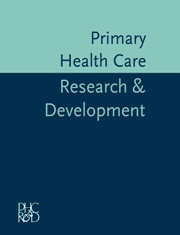
Primary Health Care Research and Development
Driving improvements in public health through scholarly excellence.Primary Health Care Research and Development is an esteemed peer-reviewed journal published by Cambridge University Press, dedicated to advancing the field of primary health care. With a focus on innovative research and development, this journal covers a wide range of topics including care planning and public health, as illustrated by its current Q2 quartile rankings in Care Planning and Public Health, Environmental and Occupational Health for 2023. The journal, which has embraced Open Access publication since 2019, strives to ensure that critical research findings are accessible to a global audience, facilitating knowledge exchange among researchers, practitioners, and policymakers. Operating from its base in the United Kingdom, Primary Health Care Research and Development not only serves as a platform for rigorous scholarly articles but also aims to influence practice and improve health care delivery worldwide, making it an essential resource for those invested in the future of primary health care.
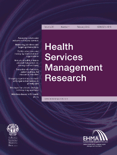
Health Services Management Research
Shaping the Landscape of Health Policy with Cutting-Edge StudiesHealth Services Management Research is a premier academic journal published by SAGE PUBLICATIONS LTD, focusing on critical areas within the health policy domain. With an ISSN of 0951-4848 and E-ISSN 1758-1044, this UK-based journal has been a valuable resource for over three decades, converging from 1988 to 2024. Recognized for its contribution to the field, it holds a commendable Q2 quartile ranking, positioning it in the top 35% of journals in Health Policy, reflecting its significant impact within the academic community, as evidenced by its rank of 109 out of 310 in Scopus rankings, placing it in the 65th percentile. The journal aims to foster innovative research that addresses the complexities of health services management, making it an indispensable resource for researchers, professionals, and students dedicated to improving health systems. Although it currently does not offer Open Access, the journal remains committed to advancing knowledge and practice in health policy management through rigorous peer-reviewed articles, case studies, and evidence-based analyses.

Family Medicine and Community Health
Shaping public health with impactful insights.Family Medicine and Community Health, published by the BMJ PUBLISHING GROUP, is a leading journal dedicated to advancing research and practice in the fields of family medicine and public health. With an impact factor placing it in the Q1 quartile for both Family Practice and Public Health, this journal is indispensable for researchers, clinicians, and policymakers aiming to shape healthcare practices effectively. Since becoming Open Access in 2013, it has prioritized the dissemination of high-quality, peer-reviewed articles to a global audience, ensuring that knowledge is accessible to all. The journal’s rigorous selection process has established its reputation, reflected in its exceptional Scopus rankings—ranked #3 out of 56 in Family Practice and #42 out of 665 in Public Health. By fostering dialogue among healthcare professionals and academic researchers, Family Medicine and Community Health plays a critical role in addressing contemporary health challenges and promoting community-oriented healthcare solutions.
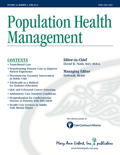
Population Health Management
Empowering researchers to shape the future of healthcare delivery.Population Health Management, published by Mary Ann Liebert, Inc., is a leading peer-reviewed journal that focuses on the intersection of health policy, management, and public health. With an impact factor reflecting its relevance in diverse healthcare discussions, this journal provides a crucial platform for researchers and professionals to share innovative methodologies and insights surrounding population health strategies. It is indexed in Scopus, boasting impressive rankings such as Q2 in Health Policy and Q1 in Leadership and Management for 2023. Covering converged years from 2008 to 2024, the journal aims to advance the field by publishing studies that address the complexities of healthcare delivery, public health initiatives, and management practices. Accessible through open access options, Population Health Management endeavors to engage a wide audience, from researchers to policymakers, aiming to improve health outcomes at the population level in the United States and beyond.
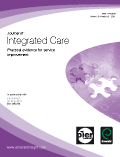
Journal of Integrated Care
Innovating Practices for Collaborative Health ManagementThe Journal of Integrated Care, published by EMERALD GROUP PUBLISHING LTD, serves as a vital platform for scholars and practitioners engaged in the multidisciplinary fields of health, public administration, and sociology. With the ISSN 1476-9018 and E-ISSN 2042-8685, this journal has established a significant presence since its inception in 1996, and continues to contribute to the advancement of integrated care practices. The journal is ranked in the Q3 quartile for Health (social science) and Public Administration, and holds a Q2 ranking in Sociology and Political Science, reflecting its influence and relevance in these fields. With a commitment to disseminating high-quality research, the Journal of Integrated Care aims to bridge gaps among various disciplines, offering insightful analysis and innovative solutions to contemporary challenges in integrated care systems. Although Open Access options are not available, the journal's articles enrich the knowledge base of professionals, researchers, and students alike, facilitating meaningful dialogue and collaboration as it converges toward its goal of improved holistic care by 2024. For further details, visit the journal's address in the United Kingdom at Floor 5, Northspring, 21-23 Wellington Street, Leeds, W YORKSHIRE LS1 4DL, ENGLAND.
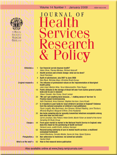
Journal of Health Services Research & Policy
Transforming Evidence into Action for Health ServicesJournal of Health Services Research & Policy, published by SAGE Publications Inc., is a leading academic journal dedicated to advancing the field of health services research and policy. With a focus on promoting evidence-based practices and innovative approaches, the journal has been an essential resource for researchers, policymakers, and practitioners since its inception in 1995. The journal is indexed under ISSN 1355-8196 and E-ISSN 1758-1060, reflecting its commitment to accessibility and relevance in the field. As of 2023, it holds a distinguished position in the top quartile in both Health Policy (Q2) and Public Health, Environmental and Occupational Health (Q2), underscoring its contribution to the academic community. With its strong Scopus ranking—placed #88 out of 310 in Health Policy and #222 out of 665 in Public Health—the journal is recognized for publishing impactful research that shapes healthcare landscapes globally. Although it does not operate under an open access model, the Journal of Health Services Research & Policy remains a vital platform for fostering dialogue on pressing health issues and influencing policy decisions, making it a must-read for those looking to stay at the forefront of health services research.
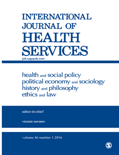
INTERNATIONAL JOURNAL OF HEALTH SERVICES
Exploring the frontiers of health services research since 1971.The INTERNATIONAL JOURNAL OF HEALTH SERVICES, published by SAGE PUBLICATIONS LTD, stands as a vital resource for professionals and researchers in the field of health policy and management. Established in 1971, this journal has been instrumental in disseminating cutting-edge research, with a notable Scopus ranking of #65/270, placing it in the 76th percentile within its category. With its emphasis on empirical research and theoretical discussions, it aims to enhance the understanding of health service delivery systems globally. Though the journal's coverage has been discontinued in Scopus as of 2022, it continues to provide critical insights and facilitate scholarly conversation in the health services domain. Access to its articles is enable through various modes, allowing researchers and practitioners to stay informed on the latest developments and trends in health policy. The INTERNATIONAL JOURNAL OF HEALTH SERVICES not only serves as an academic forum but also as a catalyst for improving health outcomes through informed policy decisions.

BMC HEALTH SERVICES RESEARCH
Advancing health policy through impactful research.BMC Health Services Research is a leading open-access journal dedicated to advancing the field of health policy and services research. Published by BMC since 2001 and based in the United Kingdom, this journal has established itself as an essential resource for researchers, professionals, and students alike, fostering a deeper understanding of health care systems and policies. With an impressive 2023 Q1 ranking in the Health Policy category and a Scopus rank of 90/310, it clearly demonstrates its commitment to high-quality, impactful research. The journal's open-access model ensures that research findings are accessible to a global audience, promoting collaboration and innovation in health services. Spanning from 2001 to 2024, BMC Health Services Research is poised to remain at the forefront of health services research, making significant contributions to policy formulation and practice improvement in the healthcare sector.
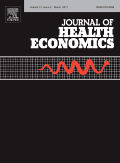
JOURNAL OF HEALTH ECONOMICS
Elevating Health Systems through Rigorous Economic AnalysisJOURNAL OF HEALTH ECONOMICS, published by Elsevier, is a leading peer-reviewed journal in the fields of health policy and public health, with an impressive impact factor indicative of its significance in academic research. Since its inception in 1982, the journal has been a pivotal platform for disseminating impactful research that influences health care policies and economic evaluations, addressing critical topics that drive effective health care delivery and resource allocation. With its current ranking of Q1 in both Health Policy and Public Health, Environmental and Occupational Health, it is recognized among the top journals in these areas, boasting a Scopus rank that places it in the top percentiles of health-related publications. Although it operates under a subscription model, researchers and practitioners benefit from its rich repository of studies and analysis that advance knowledge and practice in health economics. The journal remains committed to fostering interdisciplinary dialogue, making it an invaluable resource for researchers, professionals, and students committed to improving health systems and outcomes.